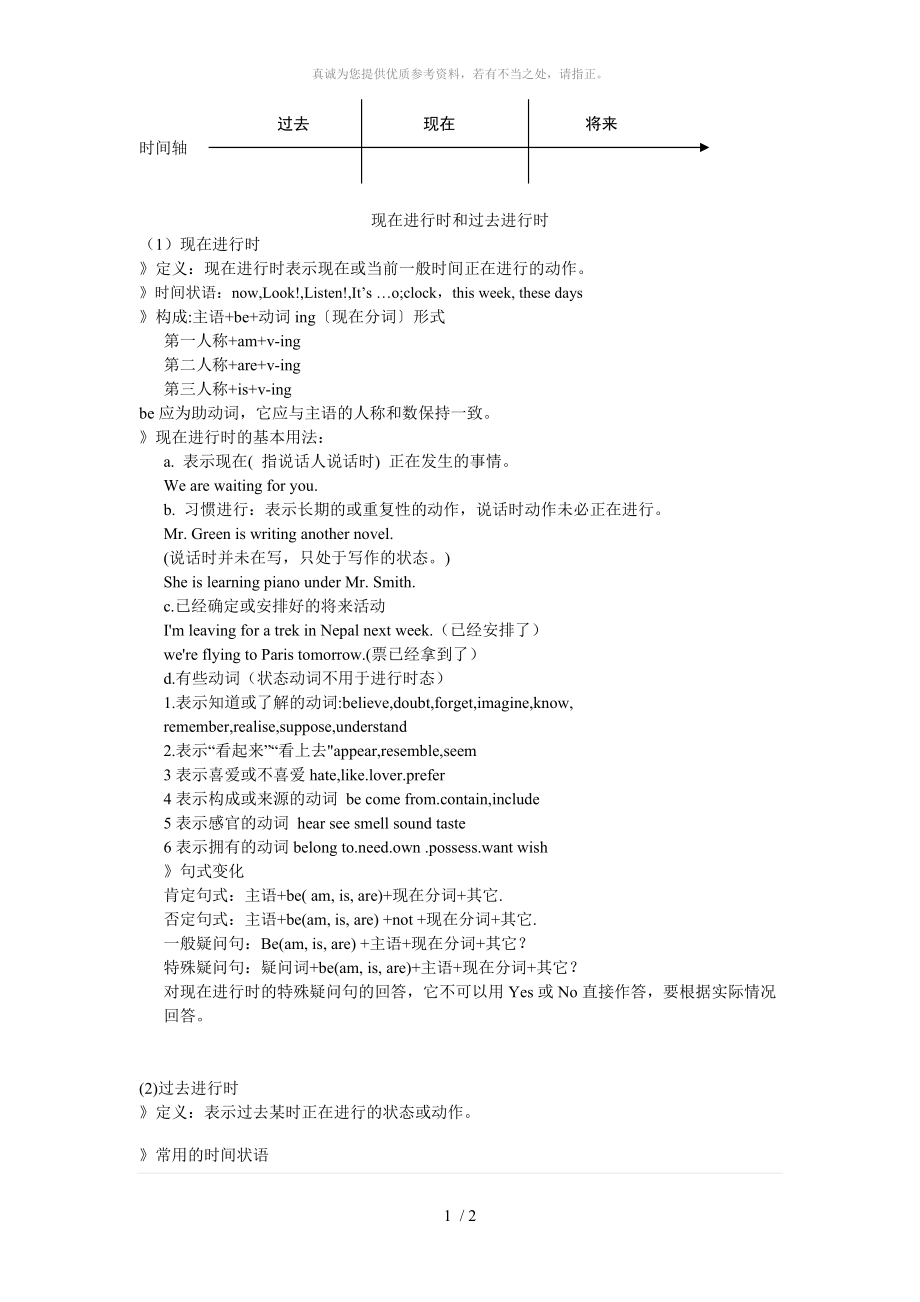《現(xiàn)在進(jìn)行時(shí)和過(guò)去進(jìn)行時(shí)知識(shí)要點(diǎn)》由會(huì)員分享���,可在線閱讀���,更多相關(guān)《現(xiàn)在進(jìn)行時(shí)和過(guò)去進(jìn)行時(shí)知識(shí)要點(diǎn)(2頁(yè)珍藏版)》請(qǐng)?jiān)谘b配圖網(wǎng)上搜索。
1�����、真誠(chéng)為您提供優(yōu)質(zhì)參考資料�����,若有不當(dāng)之處����,請(qǐng)指正。
過(guò)去 現(xiàn)在 將來(lái)
時(shí)間軸
現(xiàn)在進(jìn)行時(shí)和過(guò)去進(jìn)行時(shí)
(1)現(xiàn)在進(jìn)行時(shí)
》定義:現(xiàn)在進(jìn)行時(shí)表示現(xiàn)在或當(dāng)前一般時(shí)間正在進(jìn)行的動(dòng)作�����。
》時(shí)間狀語(yǔ):now,Look!,Listen!,It’s …o;clock��,this week, these days
》構(gòu)成:主語(yǔ)+be+動(dòng)詞ing〔現(xiàn)在分詞〕形式
第一人稱+am+v-ing
第二人稱+are+v-ing
第三人稱+is+v-ing
be應(yīng)為助動(dòng)詞�,它應(yīng)與主語(yǔ)的人稱和數(shù)保持一
2��、致。
》現(xiàn)在進(jìn)行時(shí)的基本用法:
a. 表示現(xiàn)在( 指說(shuō)話人說(shuō)話時(shí)) 正在發(fā)生的事情��。
We are waiting for you.
b. 習(xí)慣進(jìn)行:表示長(zhǎng)期的或重復(fù)性的動(dòng)作����,說(shuō)話時(shí)動(dòng)作未必正在進(jìn)行。
Mr. Green is writing another novel.
(說(shuō)話時(shí)并未在寫(xiě)����,只處于寫(xiě)作的狀態(tài)。)
She is learning piano under Mr. Smith.
c.已經(jīng)確定或安排好的將來(lái)活動(dòng)
I'm leaving for a trek in Nepal next week.(已經(jīng)安排了)
we're flyi
3��、ng to Paris tomorrow.(票已經(jīng)拿到了)
d.有些動(dòng)詞(狀態(tài)動(dòng)詞不用于進(jìn)行時(shí)態(tài))
1.表示知道或了解的動(dòng)詞:believe,doubt,forget,imagine,know, remember,realise,suppose,understand
2.表示“看起來(lái)”“看上去"appear,resemble,seem
3表示喜愛(ài)或不喜愛(ài)hate,like.lover.prefer
4表示構(gòu)成或來(lái)源的動(dòng)詞 be come from.contain,include
5表示感官的動(dòng)詞 hear see smell sound taste
6表示
4�、擁有的動(dòng)詞belong to.need.own .possess.want wish
》句式變化
肯定句式:主語(yǔ)+be( am, is, are)+現(xiàn)在分詞+其它.
否定句式:主語(yǔ)+be(am, is, are) +not +現(xiàn)在分詞+其它.
一般疑問(wèn)句:Be(am, is, are) +主語(yǔ)+現(xiàn)在分詞+其它?
特殊疑問(wèn)句:疑問(wèn)詞+be(am, is, are)+主語(yǔ)+現(xiàn)在分詞+其它�����?
對(duì)現(xiàn)在進(jìn)行時(shí)的特殊疑問(wèn)句的回答,它不可以用Yes或No直接作答����,要根據(jù)實(shí)際情況回答���。
(2)過(guò)去進(jìn)行時(shí)
》定義:表示過(guò)去某時(shí)正在進(jìn)行的狀態(tài)或動(dòng)作����。
》常用的時(shí)間狀語(yǔ)
5、 this morning, the whole morning, all day yesterday, from nine to ten last evening, when, while
My brother fell while he was riding his bicycle and hurt himself.
It was raining when they left the station.
When I got to the top of the mountain, the sun was shining.
》句式:主語(yǔ)+was/were+動(dòng)詞ing+其
6���、他����。
1. was/were+Ving
eg:My morther was cooking at 6:00p.m. yesterday.(直接表達(dá))
2. 用while連接
eg:My mother was cooking while I was doing my homework.(可以持續(xù)動(dòng)作時(shí)態(tài)一致)
3. when表示
eg:I was doing my homework when my mother came in.(間接表達(dá)了具體時(shí)間)
》過(guò)去進(jìn)行時(shí)的主要用法
1.表示過(guò)去某一時(shí)間內(nèi)(正在)進(jìn)行的動(dòng)作
如:I was doing
7�、my homework at 9 p.m. last Sunday.
2.表示一動(dòng)作正在進(jìn)行時(shí),另一動(dòng)作同時(shí)正在進(jìn)行.
如:I was reading books while he was cleaning the floor.
3.表示一個(gè)動(dòng)作正在進(jìn)行時(shí)���,另一個(gè)動(dòng)作發(fā)生了
如:He played when I was studying.
4.表示過(guò)去將要發(fā)生的動(dòng)作
She told us Mr.Lee was arriving here.
5.用于故事��,以提供其時(shí)間背景
6.表示禮貌
》句型變化
肯定句:主語(yǔ)+was/were+doing+其它
否定句:主語(yǔ)+was/were+not+doing+其它
一般疑問(wèn)句及答語(yǔ):Was/Were+主語(yǔ)+doing+其它 答語(yǔ):Yes,I was./No,I wasn't.
特殊疑問(wèn)句:特殊疑問(wèn)詞+was/were+主語(yǔ)+doing+其它
2 / 2
 現(xiàn)在進(jìn)行時(shí)和過(guò)去進(jìn)行時(shí)知識(shí)要點(diǎn)
現(xiàn)在進(jìn)行時(shí)和過(guò)去進(jìn)行時(shí)知識(shí)要點(diǎn)

